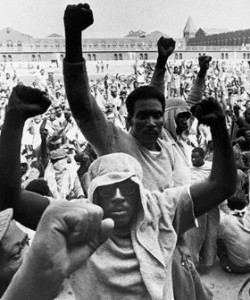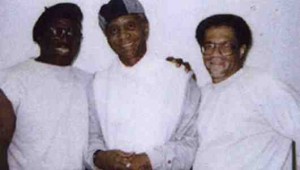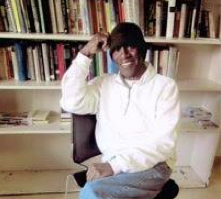Herman Wallace has spent decades and decades in solitary confinement. Herman Wallace is dying of liver cancer. Herman Wallace isn't looking for your pity. Herman Wallace is a man (and, in one of the few instances I can think of, I use the word "man" in a positive way).
I have written about Herman Wallace and the Angola Three numerous times. I merely call your attention to my post "Buried in Cages of Cement and Steel" from January of 2010, for example. I don't know what to write that I haven't written before.
I will only mention that Wallace was finally released from solitary following his cancer diagnosis. However, the prison failed to administer the recommended chemo drugs for six weeks until his lawyer raised hell. By then, however, Herman had lost fifty pounds and was no longer able to respond to treatment.
Still the state can't see a way to free a man who never should have been locked up in the first place.
In a statement he made on September 10th, Herman Wallace said,
"Nothing can be done for me medically within the standard care that (my oncologists) are authorized to provide. They recommended that I be admitted to hospice care to make my remaining days as comfortable as possible. I have been given two months to live.
I want the world to know that I am an innocent man and that Albert Woodfox is innocent as well. The state may have stolen my life, but my spirit will continue to struggle along with Albert and the many comrades that have joined us along the way here in the belly of the beast."
Too many comrades, too long...Makes me so angry, so sick, so disgusted...and so ashamed that we haven't been able to do more.
Herman Wallace is, indeed, a man.
The first post below for Scission Prison Friday is from Hip Hop and Politics. The second is from Slate.
Angola 3 Political Prisoner Herman Wallace Given 2 Months to Live
The Sorry Injustice of the Angola Three
Release Herman Wallace—he is about to die of cancer in prison after 40 years in solitary confinement.

Two men watch television in the Angola State Penitentiary in Louisiana, where Herman Wallace, one of the Angola Three, is held.
Photo by Gilles Mingasson/Getty Images
Herman Wallace spent over four decades alone in a 6-by-9-foot prison cell. For 41 years, he has stretched, wretched, ached, medicated, grown, and deteriorated—all in the three paces he could take from his toilet to his closed cell door.
This week, while awaiting a federal judge’s decision on a petition he brought challenging the conviction that put him in solitary confinement, Wallace, who is 73, stopped an ineffective chemotherapy regime for a liver tumor. Because of the cancer diagnosis, Judge Jackson agreed to an expedited ruling over a month ago, but hasn’t issued it yet. Wallace, meanwhile, has been told he has two months to live.
Wallace is one of the Angola Three, a trio of men who have become fixtures in prisoner exoneration lore both for the evidence of misconduct in their cases and for the political undertones of their decades-long solitary confinement. They’ve been held in Louisiana’s legendary Angola prison, which is named for the slave plantation that once occupied the grounds. Angola is also referred to as “the Farm,” and when you enter its gates after a long, lonely drive, you see inmates, mostly African-American, tending fields of cotton, wheat, and corn.
Robert Hillary King, the third member of the Angola Three, was also active in the Black Panther Party. He did not arrive at Angola until after the Miller incident. Yet he served 29 years in solitary confinement for an inmate murder he did not commit before his release in 2001.
The Angola Three have won national and international attention. Amnesty International includes the men on its watch list of political prisoners, and this June, the organization called on Gov. Bobby Jindal to release Wallace on humanitarian grounds. In July, members of the House Committee on the Judiciary, including Rep. John Conyers (Michigan) and Rep. Cedric Richmond (Louisiana), sent a letter to the U.S. Department of Justice, asking for a federal investigation of Louisiana’s punishment practices. They drew particular attention to the Angola Three and called the state’s treatment of Herman Wallace “unconscionable.”
The murder case is embarrassingly weak and rife with evidence of investigative and prosecutorial misconduct, including the bribing of witnesses and the suppression of exculpatory evidence. Even Brent Miller’s widow has come out in support of revisiting the men’s convictions. The case rests on four inmate witnesses, each of whom gave statements inconsistent with their testimony. Wallace’s lawyers learned decades later that the witnesses were promised all sorts of favors, including cigarettes, food, and even the possibility of a pardon in one case, in exchange for their testimony. One of the Angola wardens at the time has been recorded saying of the state’s primary witness, Hezekiah Brown: “you could put words in his mouth.” A bloody fingerprint and a number of other prints found at the scene matched none of the defendants, yet the prison didn’t try to find a match among the rest of the prison population.
In 2009 federal Magistrate Judge Docia Dalby wrote that the extreme length of Wallace’s and Woodfox’s isolation was “so far beyond the pale that this Court has not found anything even remotely comparable in the annals of American jurisprudence.” So why has it continued?
In a 2008 deposition, Angola Warden Burl Cain said “Albert Woodfox and Herman Wallace is (sic) locked in time with that Black Panther revolutionary actions they were doing way back when, and that they’re still hooked up to that.” Asked to assume Woodfox was innocent of the Miller murder, Cain still insisted he should remain isolated. Otherwise “I would have me all kinds of problems, more than I could stand, and I would have the blacks chasing after them. I would have chaos and conflict, and I believe that.” Courts and legislators usually defer to prison officials like Cain—a central reason that 80,000 prisoners are currently in solitary confinement in American jails and prisons.
If Judge Jackson overturns Wallace’s murder conviction, he could be released on bail. Rep. Cedric Richmond wrote a letter Thursday encouraging Jackson to take this step. But Louisiana Attorney General James “Buddy” Caldwell has indicated he will do what it takes to keep Wallace locked up. Caldwell has also denied that Wallace was held in solitary. "Let me be clear," heconcluded in a statement last spring, "Woodfox and Wallace are GUILTY and have NEVER been held in solitary confinement." In 2008, Judge Jackson overturned Woodfox’s conviction and ordered release on bail, at which point Caldwell requested an emergency appeal. The famously conservative Court of Appeals for the Fifth Circuit reversed Jackson before Woodfox’s release could even be processed.
Jindal could also let Wallace out of prison, with the consent of a pardon board, by granting him clemency. But the governor won’t discuss the matter, either with Wallace’s supporters or with the press.
After his cancer diagnosis in June, Wallace was moved out of solitary so that he could receive treatment in the prison infirmary without being shackled during transport. He had already lost 45 pounds over a span of six months at that point. He is still out of solitary, living in a prison hospital room, but after three months of chemotherapy, he is quite literally depleted.
Now, nearing the end of his physical battles, Wallace is looking ahead. For years, he has been collaborating with artist Jackie Sumell to design a dream house—a conceptual escape from his solitary cell that is also a project to build a real house that will serve as a youth center in New Orleans’ Seventh Ward. In July, a documentary about the project, Herman’s House, debuted on public television. Wallace is using his last days to focus on fundraising for it. He gave Sumell a bit of encouragement on a recent visit: “Kiddo, you gotta get on your game. You’re going to be the face of this now.”





